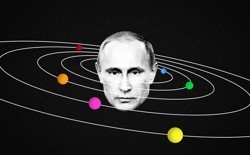Articles published in The Eye are written by a team of contributors and edited by the multi-award winning former BBC news and current affairs reporter, Phil Parry.
After 17 years in power, Putin, too, probably feels entitled to the presidency. In the eyes of the ruling elite, state bureaucracy, and his supporters (who still constituent a majority), he embodies the continuation of the current politics and—though it may sound strange to non-Russians—a sort of predictability, albeit one rife with corruption and cronyism. Russia has little experience with the smooth transition of power, so Putin’s familiar face and name, on their own, offer security. Putin wishes to remain in power not only because he likes being president (he does) but because he believes himself to be far more experienced and prepared for the myriad domestic and international challenges ahead than anyone else. In so doing, he has become the very definition of the establishment.
The analogy has clear limits, of course: Putin’s “establishment” strength is backed by an authoritarian system and rigged elections. Voters in America were free to reject Clinton, and did so. The scale of establishment corruption in Putin’s Russia isn’t close to comparable to the United States.In Russia, the recent round of anti-corruption protests revealed that grass-roots politics in the country is not dead. These protests differed from those of 2011 and 2012, which were sparked by the flawed elections of 2011. This time, the demonstrations occurred across the country, and drew the participation of all the country’s major cities (the protests of five years ago were confined largely to Moscow and St. Petersburg). The immediate pretext was outrage over Prime Minister Dmitri Medvedev’s vast real estate holdings, fueled by opposition politician Alexey Navalny; Muscovites were also protesting against a city housing program that attempted to demolish tenants’ property. Both demonstrations targeted the sort of upper-level corruption that infects Putin’s government: Rewarding high-ranking bureaucrats and businessmen from his inner circle for services and loyalty, with the possibility of getting richer by using and abusing state properties and contracts.For Russia’s youth, who made up the bulk of those who took to the streets, this merging of business and political interests embodies the injustice of life under Putin (the protests even had overtones of Occupy Wall Street). These Russians resent the corruption and crony capitalism that have enriched so few at the expense of so many. Many can’t even remember a Russia before Putin. They place Russia’s problems at his feet, but don’t hear any solutions from him. Their chief complaint is not that he is too conservative or too liberal, but that he embodies the corrupt establishment, which has lost their trust.
Much of this tension grew, ironically, from Putin’s desire to be embraced by the global community. In his first two presidential terms, he tried hard to join the global establishment. He clearly enjoyed his interactions with its leaders, and desired their respect. But when they rejected him, he turned against them, seeking instead to build a new patriotic consensus by disrupting the post-war liberal order.For many Russians, there is a blatant contradiction between the patriotic consensus Putin seeks and the immiseration they face at home. The economic growth of his early years in office has been replaced with the idea of suffering—the hardship of stagnation and sanctions that are the apparent price for assertive foreign policy. But the wages of privation do not seem to extend to the new generation of oligarchs he has surrounded himself with—his old friends, including Gennady Timchenko, the Rotenberg brothers, and Igor Sechin, all of whom became billionaires during his rule, and even receive support from the state. (Parliament passed a special law with huge tax privileges for those touched by Western sanctions.)This is what corruption in the Putin era means. While much has been done in recent years to combat low-level corruption between citizens and authorities, his style of rule implies a “controlled corruption,” when his cronies can reckon for the reward.
It appears that Putin is much less of a disruptor than Trump. He is committed to the status quo at home and would rather join the global establishment than destroy it. In that, he is closer to Clinton than to Trump.










